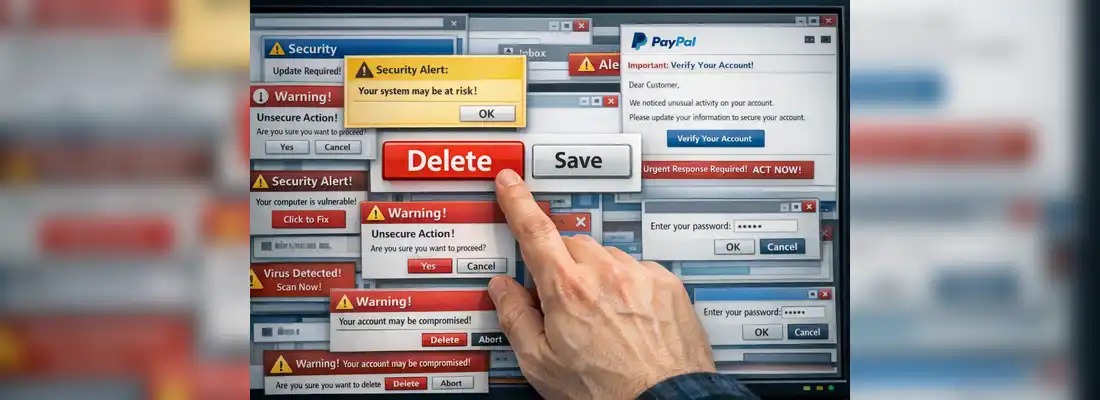Why do Project Managers need Cybersecurity Training?
Date: 4 September 2020
-1.webp?width=1170&name=107980601_l%20(1)-1.webp)
Project Management & Cybersecurity Training have become inextricably linked today. Successfully planning and executing a business/IT project for a client is almost impossible without being able to control the IT environment and security scenario in which the operations take place.
In this blog, we cover why project managers need cybersecurity training:
- Planning is critical
- Data Security is essential
- Evaluation of risks & costs is imperative
- A quintessential part of employee training
Good project management is much like a complicated dish coming together thanks to many unique ingredients blending in seamlessly. Several seemingly disparate skills and competencies have to fall into place for a project manager to be successful. Of course, PMP Certification Training courses help you refine your project management skills. Yet, it's important to remember that even cybersecurity awareness and expertise is one of the quintessential aptitudes that will help you perform at the highest levels.
Here’s why Project Management and Cybersecurity Training go hand in hand
1. Project Management starts & ends with good planning: Ask any project manager what, according to them, is the one skill that’s crucial to their business and chances are the first answer you’ll get will be – good planning skills. Successful project management is almost impossible without having a plan in place and that’s the basis for any good cybersecurity training programme too. Cybersecurity training, much like project management, is all about good planning and preparing for the worst.
While taking into account every challenge that the project may encounter in the foreseeable future, a project manager has to consider cybersecurity risks too. In a cybersecurity training programme, the project manager will learn how to plan for possible risks and threats and what to do in case of an actual breach. Cyber Incident Planning and Response, therefore, forms a critical backbone for the success of any project and this backbone can only be strengthened if the project manager has adequate training in identifying threats and responding to them with agility and precision.
2. Data Security is Critical to Project Management: Every project requires collecting and storing of sensitive data. It is essential to evaluate how project logs are being stored, how they are being shared, how they are classified and what is the protection on the devices through which these logs are being accessed.
Any breach of critical project logs and data can thwart the progress of the project and even derail it completely in many cases. Project managers must analyse and calculate how much client data is being stored on the company’s servers, which devices are being used, what is the risk exposure etc. All of these extremely important steps in the effective execution of a project are covered in any holistic cybersecurity training programme. Further, through the real-world experience of good trainers, project managers can broaden their understanding of what exactly may go wrong during the course of the execution of their well-laid plans and how they can mitigate damage.
3. Project Managers have to take risks and failures into account: If planning is key to good project management, what to do in case those plans fail is also critical to prepare for. Effective cybersecurity training programmes are built on this premise - 'you will get hacked, you will get breached and you will be victimized. There is no getting away from it. What you can do is be prepared and have a swift action plan in place for when disaster strikes.'
It is critical for a project manager to have this mindset and prepare for everything that can go wrong and have a solid Cyber Incident Response plan in place. (This template can be used to build your own). The project manager has to mandatorily evaluate how exposed the project is by benchmarking against the company’s past security record, studying the attacks on other competitors in the industry etc. They must then calculate the possible financial effects of a security disaster and the cost of reputation management that will follow and make financial projections to the client accordingly.
4. Employee Training – It is the onus of the project manager to ensure that everyone who is being onboarded for the project understands the potential security threats and risks involved. All the concerned employees are briefed on many aspects of the project and are advised on the behaviours that will make them effective for the concerned project. Similarly, they also have to be made aware of which behaviours can be deleterious to the project in terms of cybersecurity. Project managers who want a broader management foundation alongside cyber readiness can explore the GMC Online supervision and management program, an online bachelor’s pathway designed to strengthen leadership, operations, and people-management skills that support secure, compliant project delivery.
They have to, especially, be educated about the most common human errors that cause widespread breaches such as clicking on a phishing email or downloading a malicious attachment. They need to also be encouraged to report anything amiss that they may have observed or done. This sort of a healthy culture can only be created by a project manager who has received high-quality training herself and is aware of the magnitude of repercussions that human actions can have on cybersecurity and the overall health of any IT/business endeavour.
If you’re a project manager, looking for a cybersecurity training programme that’s perfect for you, check out Cyber Management Alliance’s NCSC-Certified Cyber Incident Planning & Response Course. The course, accredited by the UK Government, is the perfect stepping stone for those who want to understand the basics of cybersecurity and also develop core competencies in detecting and responding to a cyber-crime.
Not only is the course delivered by one of the most renowned cybersecurity trainers in the world, Amar Singh, it comes with a great reference material pack including worksheets, checklists, mind maps and free templates. It is the easiest and most effective way to enhance the efficiency and cyber-resiliency of your projects.



.webp)


